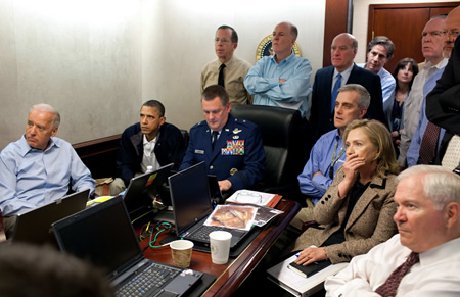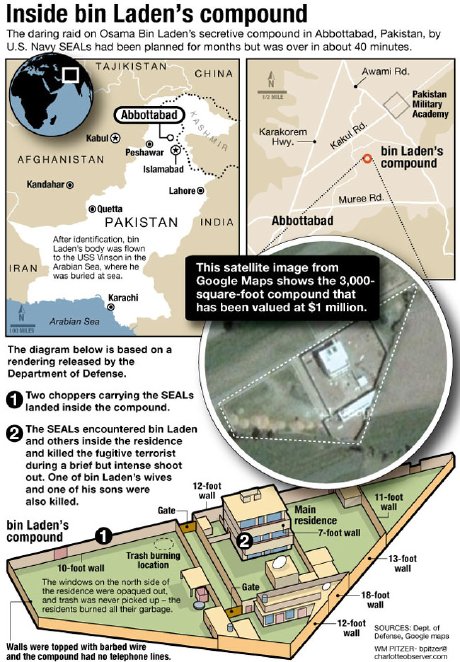Adil Najam
What do Pakistanis think about how Osama Bin Laden met his end, the implications of that end?
There are as many opinions on what happened in Abbottabad as there are Pakistanis. Maybe more. But there is no sense whatsoever where the government of Pakistan (or any of its major institutions) stand on what happened – or stood when it was happening. For 36 hours now the world has been waiting to see what Pakistan does and says – the silence and incoherence from Islamabad has not just been embarrassing, it has been damning. Finally, key institutions in Pakistan have begun trying to piece a narrative together – unfortunately it is way too late and the narrative itself rather lame.
When I put up a short post on Osama Bin Laden’s death soon after the news broke, I had hoped that in time more details would become available and we would get more clarity on what happened and how. We do now have more detail. But certainly not more clarity. The story about what happened in Abbottabad now lives in Spin-abad. Everyone – from governments, secret agencies, the media, the Twitterati, and your spinster aunt – are taking a spin. Many are taking multiple, sometimes contradictory, spins. Everyone except the Pakistan government.
That, of course, is a surprise – not only because the Pakistan government does have a lot of explaining to do, but even more because it is in the interest of the Pakistan government to do that explaining itself rather than have someone else do it for them. Yet, up until it was already too late, Pakistan seems to have abdicated that responsibility. In fact, President Barack Obama, Secretary Hillary Clinton and Senator John Kerry seemed to be making that (half-hearted) case for Pakistan more than anyone in authority in Pakistan. Given that President Obama had informed President Zardari before the speech from the US President, one would have assumed that the Pakistan President and his media handlers would have their own statement ready to go on the air minutes, if not seconds, after President Obama’s speech. This is not about spin and PR, this is Diplomacy 101: Own and define the narrative as soon and as clearly as you can before someone else defines it for you – especially if the narrative is likely to be unfavorable.
But the narrative, itself, is not the core of Pakistan’s challenges. The problem is the facts on the ground and the government’s inability and unwillingness to explain them. Pakistan is used to the feeling of the world ganging up on it. But there are good reasons for the questions being asked of Pakistan by the world today. There are even better reasons for the questions being asked of Pakistan by Pakistanis today. Whether the government comes clean to the world or not, it is vital that it respond to Pakistanis. The first is a matter of national image (no trivial issue, that), but the latter is a question of citizen trust in national institutions (an existential element of statehood).
The fact is that there is a Pakistan case to be made on this issue. And it needs to be made to Pakistanis much more than to the rest of the world. It is a case that forcefully stresses that a world, and a Pakistan, without Osama Bin Laden in it is a vastly better world than one with him in it – this is a villain who orchestrated events that have left more than 30,000 Pakistanis dead in extremism and terrorism. It is a case that legitimately highlights the sacrifices that Pakistan and Pakistanis have, in fact, made in the fight against terrorism. Most importantly, it is a case that honestly analyzes what happened in Abbottabad – it is not a surprise that Osama Bin Laden was found in Pakistan and in a large urban area (just like nearly every other major Al Qaida figure captured) – but an explanation is owed on why Pakistani intelligence failed to make the connections that led to him, an explanation is owed on exactly what Pakistan’s official role in the final operation was (or was not), and an explanation is owed on exactly what Pakistan’s strategy on countering terrorism is, who is running it, and why it is not working well enough or fast enough.
In a country and an ‘establishment’ as divided as Pakistan, this cannot be an easy conversation; it is not supposed to be. It is time to ask honest and tough questions of everyone. It has long need a necessary conversation; now is the time to have it.






















































As Indians we do have our grouses and are often bewildered with our issues with Pakistan. This however is a moment when I would leave those out of the discussion for a short while.
What it boils down to is the venality of the politicians in power, and in your case perhaps the defense establishment too, which is more a part of politics than defense.
The utter lack of regard for the common citizen has been the hallmark of sub-continental ruling elites.
I do not doubt that the vast majority of Pakistanis would love nothing more than a chance to live in peace and dignity and tend to their families and work rather than fight wars that they absolutely do not need.
Yet why is the national agenda hostage to a small minority of crooks?
Civil society’s apathy to things beyond their daily concerns is a key factor. We in India battle it in the form of corruption today. It is with some hope that the Indian civil society has taken issues into their own hands and a awakening is underway. The educated middle class so far accused of self centered silence is now taking the lead, spearheaded by the youth.
I suppose the time has come for something similar in your country too.
We as Indian’s shall always be outsiders, but would wish you well in all right minded endeavors if and when they are initiated by the segment of your society which can.
The same lies at the core of the Jasmine revolution in the Arab states, people’s will to write their own destiny. If we do not, someone else will do it for us.
Wishing you well, in your deepest darkest hour.
We realize only too well, that in peace is the only way we have a chance at finding our highest potentials as people.
Love us hate us, do as you please, but peace be upon you.
Shez,
I looked through my comments on the topic. I have comments on two different posts on the OBL killing. A total of 7 comments including this one. Of those, 2 comments say something about the army knowing about it. Two other comments are about burial at sea, and the remaining comments including this one, are clarificatory in nature and don’t repeat the point about the Pakistan army knowing about the house. The first time I posted about the army knowing about the house (which itself was a response to many different comments), my main point was that the army knew about the US operation as well and that it had decided to give up OBL to the Americans. The second time, it was in response to a pointed comment by Meengla, which I felt deserved a counter-argument. My very first comment on the issue had nothing to say about the issue at all.
Any objective person can see that there is nothing unreasonable about any of this. The only unreasonable thing on display here here is your insistence of going after the messenger rather than the message.
@Sridhar
In every comment, you have talked that the army was involved and they knew about the house and its inhabitants. You have repeated the same thing in this latest comment. That’s why I said you were just being redundant. You have made your point and that’s it. Come up with something new or hold your peace.
Apologies for a few typos in my last comment -I posted this using a phone.
Shez
What repetition are you talking about? And where do you seen even a hint of ego? I am responding to a couple of points Meengla has made which I believe to be inccorrect. What exactly is wrong with that?
Regarding the police, you make exactly my point. The police is indeed very similar in the two countries. Having seen the police in India is what makes it even more unlikely in my mind that this was a case of ineptness. It makes it even more certain that this was a designated safe house that the police knew was off limits for them.
There has been an instance of some policemen taking bribes to facilitate a terrorist organization. – back in 1993 when they allowed the Dawood Ibrahim gang to transport RDX from Pakistan into India. However, even in that instance, they thought they were facilitating smuggling, not terrorism. After the bomb blasts, it took them 2 days to fing out almost everything we know about the incident. And the perpetrators were either arrested or fled to Dubai and eventually Pakistan, where they have been sheltered. To sum up, even the mumbai blasts case was one of taking bribes to facilitate smuggling it is highly unlikely that the same policemen or Customs officials would have taken bribes of they knew what was being smuggled – before this episode Dawood was a smuggler, not a terroris.t Not a single case has come up where the terrorists were allowed to hide because the police took bribes.
Remember, Osama was the most wanted man in the world. Anybody who helped him hide after taking bribes ram the risk of being spirited away to Guantanamo and incarcerated indefinitely. I cannot see a corrupt policeman justifying such risks, whatever the amount of the bribe. Somebody would protect Osama in Abbottabad only because of ideological commitment or because they knew they were protected by the Pakistani state, in whose name they were acting.